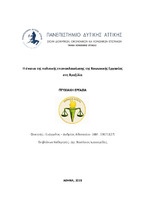| dc.contributor.advisor | Ioakimidis, Vasilios | |
| dc.contributor.author | Αθανασίου, Ευάγγελος - Ανδρέας | |
| dc.date.accessioned | 2024-03-04T16:54:37Z | |
| dc.date.available | 2024-03-04T16:54:37Z | |
| dc.date.issued | 2023-07-04 | |
| dc.identifier.uri | https://polynoe.lib.uniwa.gr/xmlui/handle/11400/5996 | |
| dc.identifier.uri | http://dx.doi.org/10.26265/polynoe-5832 | |
| dc.description.abstract | Η παρούσα πτυχιακή εργασία έχει στόχο, μέσω της βιβλιογραφικής ανασκόπησης, να αναδείξει τον τρόπο με τον οποίο εννοιολογείται η συνεχής πολιτική επαναπλαισίωση της Κοινωνικής Εργασίας στο χώρο της Λατινικής Αμερικής και πιο συγκεκριμένα στη Βραζιλία. Ειδικότερα, γίνεται αρχικά μία παρουσίαση της χώρας, ως προς την οικονομικο-κοινωνικο-πολιτική κατάσταση την τρέχουσα χρονική περίοδο, ώστε να μπορέσει ο αναγνώστης να ενταχθεί ομαλά στην πραγματικότητα του τόπου και να κατανοήσει με περισσότερη ευκολία τα πλαίσια, μέσα στα οποία επαναπροσδιορίζεται συχνά η Κοινωνική Εργασία στο
κράτος. Στη συνέχεια αναδεικνύονται οι κοινωνικο-πολιτικοί εκείνοι παράγοντες, οι οποίοι οδήγησαν στη δημιουργία της πρώτης σχολής Κοινωνικής Εργασίας στη Βραζιλία και οι τρόποι λειτουργίας της μέσα στο νέο εκείνο πλαίσιο. ‘Έπειτα, πραγματεύεται την ταραχώδη και γκρίζα περίοδο της δικτατορίας, κατά τη διάρκεια της οποίας η στρατιωτική Χούντα επιχειρεί να ορίσει εκ νέου τους κανόνες και μηχανισμούς του επαγγέλματος προς όφελος των καταπιεστικών χειραγωγών. Εκεί το ενδιαφέρον επικεντρώνεται στις μεθόδους αντίδρασης των Κοινωνικών Λειτουργών, που μέσω των κοινωνικών κινημάτων και με τη συγκρότηση συνεδρίων, επιχειρούν δυναμικά την αμφισβήτηση του Καθεστώτος και τη ρήξη του αναχρονιστικού τμήματος του κλάδου. Ακολούθως, σκιαγραφούνται οι νέες δομές, στις οποίες εντάσσεται το επάγγελμα μετά τη διάλυση της δικτατορίας και την επαναφορά της δημοκρατίας στο κράτος. Ιδιαίτερος λόγος γίνεται για την επαναφορά στην πολιτική σκηνή, εν μέσω της παγκόσμιας οικονομικής κρίσης, ακροδεξιού κόμματος στην ηγεσία της χώρας και τις αντιδημοκρατικές πρακτικές εναντίων των Κοινωνικών Λειτουργών στην προσπάθεια επαναπλαισίωσης και χειραγώγησης της Κοινωνικής Εργασίας. Ύστερα, επιχειρηματολογείται η πορεία της Κοινωνικής Εργασίας στο παρόν δημοκρατικό πλαίσιο και οι νέοι τομείς δράσης της. Τέλος, παρουσιάζονται τα βασικά σημεία της εργασίας, εξάγονται τα συμπεράσματα από τη βιβλιογραφική έρευνα και διατυπώνονται προτάσεις για ενδεχόμενες μελλοντικές εργασίες. | el |
| dc.format.extent | 103 | el |
| dc.language.iso | el | el |
| dc.publisher | Πανεπιστήμιο Δυτικής Αττικής | el |
| dc.rights | Αναφορά Δημιουργού - Μη Εμπορική Χρήση - Παρόμοια Διανομή 4.0 Διεθνές | * |
| dc.rights | Attribution-NonCommercial-NoDerivatives 4.0 Διεθνές | * |
| dc.rights.uri | http://creativecommons.org/licenses/by-nc-nd/4.0/ | * |
| dc.subject | Κοινωνική εργασία | el |
| dc.subject | Βραζιλία | el |
| dc.subject | Κοινωνικοί λειτουργοί | el |
| dc.subject | Επαναπλαισίωση | el |
| dc.title | Η έννοια της πολιτικής επαναπλαισίωσης της κοινωνικής εργασίας στη Βραζιλία | el |
| dc.title.alternative | The concept of political reframing of social work in Brazil | el |
| dc.type | Πτυχιακή εργασία | el |
| dc.contributor.committee | Teloni, Dimitra - Dora | |
| dc.contributor.committee | Papamichail, Stella | |
| dc.contributor.faculty | Σχολή Διοικητικών, Οικονομικών & Κοινωνικών Επιστημών | el |
| dc.contributor.department | Τμήμα Κοινωνικής Εργασίας | el |
| dc.description.abstracttranslated | This thesis aims, through the bibliographic review, to highlight the way in which the continuous political reframing of Social Work is understood, around Latin America and more specifically, in Brazil. In particular, there is initially a presentation of the country, in terms of the economic-social-political situation, in the current time period, so that the reader can join the reality of the place and understand more easily, the contexts in which it is often redefined, Social Work in the state. Then, are highlighted, the social-political factors that led to the creation of the first school of Social Work in Brazil and its modes of operation within that new context. Then it deals with the turbulent and grey period of the dictatorship, where the military Junta attempts to redefine the rules and mechanisms of the profession, to the benefit of oppressive manipulators. There, the interest is focused on the processing methods of the Social Workers, who through social movements and by organizing conferences, dynamically attempt to challenge the regime and rupture of the anachronistic part of the branch. Next, the new structures in which the profession is included, after
the dissolution of the dictatorship and the restoration of democracy to the state, are outlined. Particular discussion is given for the return to the political scene, in the midst of the global economic crisis, of a far right party in the leadership of the country and the anti-democratic practices against Social Workers, in the attempt to reframe and manipulate Social Work. Then, the course of Social Work in the present democratic framework and its new areas of action, is argued. Finally, the main points of the work are presented, the conclusions from the bibliographical inquiry are examined and proposals for possible future work are formulated. | el |


